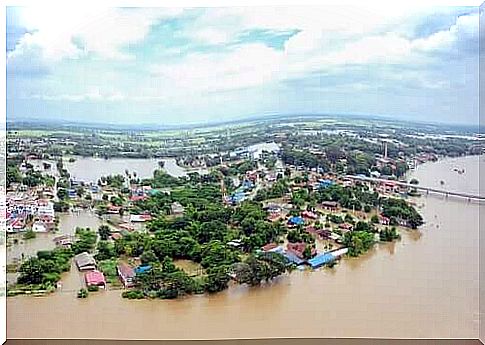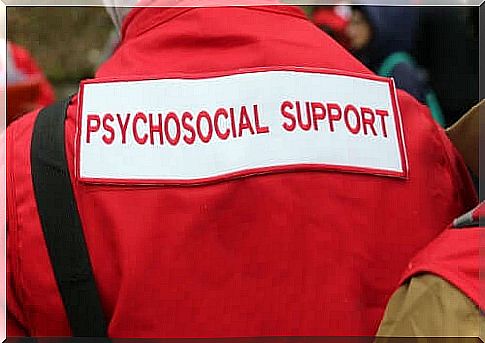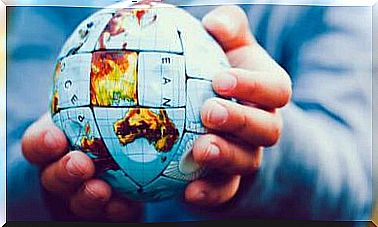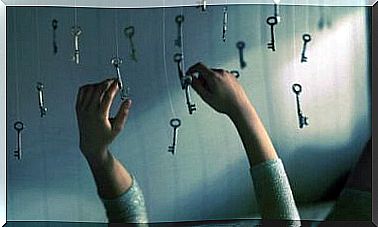The Importance Of Psychosocial Support After Disasters

Psychosocial support after disasters aims to minimize the psychological and social consequences during and after a catastrophic event.
Teams for psychosocial interventions usually consist of coordinators, psychologists and volunteers with a special type of training. They work at two different times.
The first is after a disaster. The second is before it happens through preventive work that tries to reduce possible vulnerable points in a given society. But what exactly is a disaster?
Definition of a disaster
Disasters are both natural and man-made and lead to a common threat that is so great that it exceeds an individual’s ability to respond to it.
Scientific evidence indicates that natural disasters do not leave as many psychological consequences as those caused by humans.
However, both have consequences and can be devastating for an entire society, which is why they often lead to suffering in individuals.
Psychosocial support after disasters

After a disaster, there are several variables that can influence a situation either positively or negatively. Society must be able to rebuild what it has lost from a psychosocial perspective.
You must therefore:
- Feel that you belong to something. Society should not feel like a victim but a survivor.
- Work towards a social climate. This is related to the recognition of the suffering that society has experienced.
- Regain control of life to avoid helplessness and addiction.
- Repeat old routines to reduce uncertainty.
- Develop instrumental tools. Here we talk about dignity and social support.
Psychosocial support for people
When you reach a disaster area, the support team must act to help everyone whose psychological resources are not sufficient for them to be able to handle what has happened. They will therefore have a priority.
This is known as psychological first aid. It is quite intense and short-lived and does not necessarily correspond to a direct request from the affected person.
The team can follow their own initiatives and offer help. However, such actions must follow seven principles:
- Security. To begin with, the law must ensure the physical integrity of those affected.
- Vicinity. They must provide psychosocial support in the environments close to the disaster site.
- Quick action. This is a very important factor in preventing chronic symptoms.
- Normalization. Management of the individual who experiences normal reactions to abnormal situations.
- Activate. Implement the strategies that each individual has to deal with situations. It is also important to activate their social network so that they help prevent the situation from getting worse.
- Simplicity. Information should be provided in a simple and concise manner so that the affected people can handle it better.
- Flexibility. Psychosocial care must be adapted to specific situations, and existing strategies should be modified if necessary.
What to do if you need psychosocial support after disasters

When such a serious incident occurs, it can be difficult to take care of an affected person if you do not have the right education. For example, what is the right thing to say? What should be done and what is appropriate?
Here are some of the top recommendations for psychosocial support:
- First of all, do not promise something that you can not do.
- Respect and appreciate silence.
- Stay as calm as you can.
- Allow and validate any emotional expressions from the survivors.
- Respect the religious beliefs of each individual, or the absence of them.
- Do not force the affected person to do something he does not want to do at any given time.
- Avoid confrontations with the affected person.
- Did not instruct an affected person regarding the incident. Instead, encourage the person to have a dialogue on a transcendental level.
- Listen if a survivor wants to talk.
- Always take suicide threats and murder seriously.
As a final reflection: when you think of a disaster, you often take into account an event that occurs within a limited time and space. It could be an earthquake, a volcanic eruption, a traffic accident, a major industrial accident, etc.
However, this is not always the case. A disaster can also be due to a long war or to famine or some other phenomenon that lasts for a certain period of time.
The work of psychosocial support teams during disasters is not just about offering support at specific times.
In many cases, these interventions must continue until society returns to the same functional level it had before the accident.









